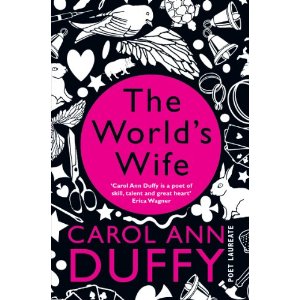Published: 1999
Author: Carol Ann Duffy
A female perspective on some of history’s most enduring stories
Ever since I was an eager young English student trying to emulate older friends I’ve tried to convince myself that I love poetry. I bought vast collections which still sit unread on my bookshelves and nodded sagely whenever people spoke about poetry. Then about a year or so ago I finally admitted that I’m not one of those cool, knowledgeable, intelligent poetry aficionados. There are some poems that I do love – Tennyson’s The Lady of Shallot, Tam O’Shanter by Burns and a sweet little Victorian love poem called Alchemy are favourites but on the whole I’d rather read a piece of prose or listen to some music.
Even though I’ve accepted my fate as a poetry philistine I was intrigued to learn of Carol Ann Duffy’s first themed collection The World’s Wife, which takes familiar male-centric myths and history and retells them from a female point of view. I really like the reimagining of well-known stories and thoroughly enjoyed Margaret Attwood’s Penelopiad, a feminisation of the Iliad, so I decided to give it a go.
The collection contains 30 poems and includes the views of Mrs Midas, Pilate’s Wife, Queen Kong, The Kray Sisters and Mrs Icarus. The poems vary in length and style – some last several pages, others only a few lines and at first I found this constant change of style a bit unsettling. By the end of the book however I had come to appreciate the differences. Each character has been historically silenced but now has her own unique voice.
My enjoyment varied from poem to poem. I wasn’t aware of all of the legends or historical sources alluded to, so my understanding of a couple of the poems was limited and I had to do a little research before I could appreciate them. Others I understood straight away and it is these (unsurprisingly) which I enjoyed most.
My two favourite poems in the collection are the two shortest – Mrs Darwin and Mrs Icarus. Both made me roar with laughter, perhaps because they shatter so efficiently the illusion of the great man. Another favourite is Mrs Aesop which amusingly describes the frustration faced by the partner of someone regarded by everyone else as brilliant, but who in reality is simply annoying. Duffy manages to capture the emotions of her characters in only a few words and that is a great talent.
Not all of the poems are funny. The Devil’s Wife – inspired by Moors Murderer Myra Hindley – is a troubling look at how society demonises women who are guilty of terrible crimes. My mind turned to the cases of Rose West and the boys who killed James Bulger. Why are women and children regarded as more evil than grown men?
The range of topics covered is vast. From relationships with men to childbirth, face-lifts and travel all manner of female experience is in this collection. I find Carol Ann Duffy fascinating. The first woman, Scot and openly gay person to be appointed as Britain’s Poet Laureate, she refuses to be constrained by the expectations of what the role should be. Her work accurately reflects the experiences of living in 21st Century Britain. During her tenure she has written about MPs’ expenses, the Icelandic volcano, the impact of HIV/AIDS on the LGBT community and most recently a tribute to Tariq Jahan.
I’m still convinced that poetry isn’t really my cup of tea; it’s just not for me (see what I did there?) but I enjoyed The World’s Wife a lot and I’m likely to dip in and out of it from time to time. Especially to re-read the brilliant Mrs Darwin and Mrs Icarus.


